US president says Tehran violating spirit of nuclear deal; said set to decertify Iran accord, impose ‘harsh sanctions’ on IRGC
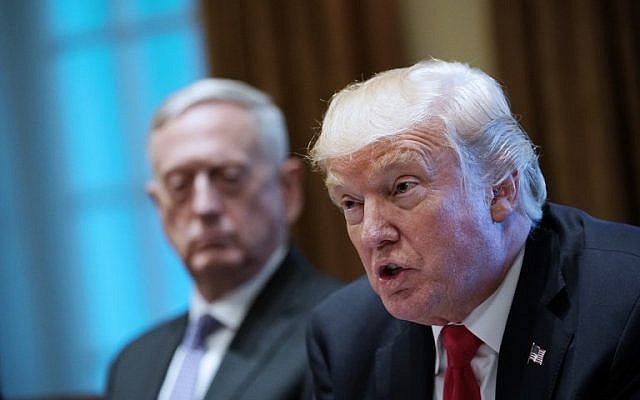
US President Donald Trump on Thursday insisted Iran has not acted in keeping with a deal to curb its nuclear program, days before he must decide on the future of the accord.
“You will be hearing about Iran very shortly,” said Trump as he met military leaders to discuss the issue.
“They have not lived up to the spirit of the agreement,” said Trump, who appeared poised to withhold certification of Iran’s compliance, leaving Congress to weigh sanctions that could scupper the deal.
“The Iranian regime supports terrorism and exports violence and chaos across the Middle East,” Trump said.
“That is why we must put an end to Iran’s continued aggression and nuclear ambitions,” he said. “You will be hearing about Iran very shortly.”
Trump was set to announce that the landmark Iranian nuclear deal signed in 2015 does not serve US national interests and that he will decertify but not withdraw from the accord.
The Washington Post, citing persons briefed on the White House’s Iran strategy, reported Thursday that Trump is set to make this announcement next week, ahead of an October 15 deadline to report to Congress on whether Iran is complying with the agreement.
Ahead of the deadline, several officials familiar with White House deliberations told AFP Trump has made it clear he does not want to certify Iran’s compliance with the accord, flying in the face of advice from some of his closest advisers.
But the Post reported that Trump’s senior national security advisers agreed over the past several weeks to recommend that Trump decertify the agreement at the October 15 deadline.
The move would prompt a 60-day congressional review period to consider the next steps for the United States, which, along with five other states, signed onto the accord.
The White House, according to the report, has been discussing ways to “strengthen” the Iranian nuclear agreement, congressional aides and others said, adopting a “fix it or nix it” approach advocated by Israeli Prime Minister Benjamin Netanyahu .
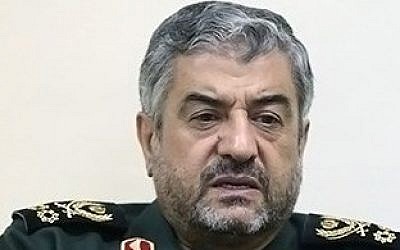
Israel’s Channel 2 reported earlier Thursday that Trump was also set to announce a series of measures to punish Iran for its regional behavior.
Chief among these, the TV report said, would be “harsh sanctions” against the IRGC, Iran’s most powerful security organization which also dominates significant areas of the Iranian economy. Some reports in the US have suggested that Trump may designate the entire IRGC as a terrorist organization; 10 years ago, it designed the IRGC’s Al-Quds Force as a terror group, and the entire IRGC has been sanctioned for activities relating to nuclear proliferation and human rights abuses.
But the Washington Post reported, citing four people familiar with the president’s thinking, that Trump would “hold off on recommending that Congress reimpose sanctions on Iran that would abrogate the agreement.”
IRGC leaders frequently threaten Israel and the US. The IRGC’s commander, Gen. Mohammad Ali Jafari, declared in 2012 that war with what he called “this cancerous tumor Israel” will “eventually happen,” and that the Islamic Republic would “destroy the Jewish state.” Last year, a senior adviser to the Al-Quds Force boasted that Iran could “raze the Zionist regime in less than eight minutes.”
Last month, Jafari urged his country to use “all its options” and take unspecified “actions” in the next few months to cause pain to the United States. “Taking a decisive position against Trump is just the start,” he went on, in remarks quoted by the Fars news agency, “and what is strategically important is that the US should witness more painful responses in the actions, behavior and decisions that Iran will take in the next few months.”
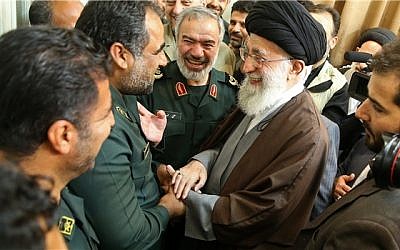
The Associated Press reported on Wednesday that officials familiar with the president’s planning said he is preparing to deliver an Iran policy speech next week in which he is expected to declare the landmark 2015 agreement contrary to America’s national security interests.
The speech has been tentatively scheduled for Oct. 12 at an as yet undetermined venue in Washington, according to two officials. They cautioned that plans could still change, and the White House declined to comment on the timing or substance of Trump’s pending announcement.
The president has called the 2015 deal, which forced Iran to scale back its nuclear program in exchange for broad relief from international economic sanctions, one of the nation’s “worst and most one-sided transactions” ever. But many of his top national security aides don’t want to dismantle the deal, and America’s European allies have lobbied the Trump administration heavily not to walk away from the agreement.
“We’re going to give him a couple of options of how to move forward to advance the important policy toward Iran,” Secretary of State Rex Tillerson told reporters Wednesday. He said the Iran deal comprised “only a small part” of the government’s approach to Iran, a traditional US adversary in the Middle East that Washington considers the world’s leading state sponsor of terrorism.
The Iran deal’s future may hinge on a face-saving fix for Trump so he doesn’t have to recertify the Islamic republic’s compliance every 90 days, as mandated in a provision of a 2015 US law known as the Iran Nuclear Agreement Review Act.
Several officials familiar with internal discussions say the periodic deadlines have become such a source of embarrassment for Trump that his aides are trying to find ways for him to stop signing off on the accord without scuttling it entirely.
Trump has said repeatedly that he doesn’t want to certify Iranian compliance again after having done so twice already, declaring last month he even had made his mind up about what he’ll do next.
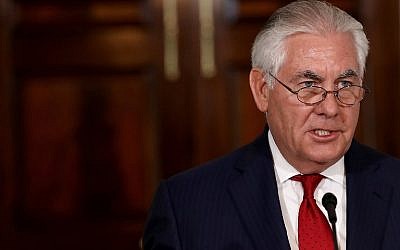
“Decertification” could lead Congress to reintroduce economic sanctions on Iran that were suspended under the deal. If that happens, Iran has threatened to walk away from the arrangement and restart activities that could take it closer to nuclear weapons.
Because the UN nuclear watchdog has found Iran in compliance, it’s difficult for the US administration to say otherwise. However, Trump and other officials, including Tillerson, have said Iran is violating the spirit of the agreement because of its testing of ballistic missiles, threats to US allies in the Middle East, and support for US-designated terrorist organizations and Syria’s government.
Gen. Joseph Dunford, the chairman of the Joint Chiefs of Staff, told the Senate Armed Services Committee on Tuesday that Iran “is not in material breach of the agreement.” At the same hearing, Defense Secretary Jim Mattis said he believed the deal is still in the US national security interest.
For US officials involved in the decision-making process, the focus on finding a way for Trump to avoid anything looking like approval for the accord has become a source of frustration. Various options are in play to resolve the problem, but none are clean solutions, according to officials.
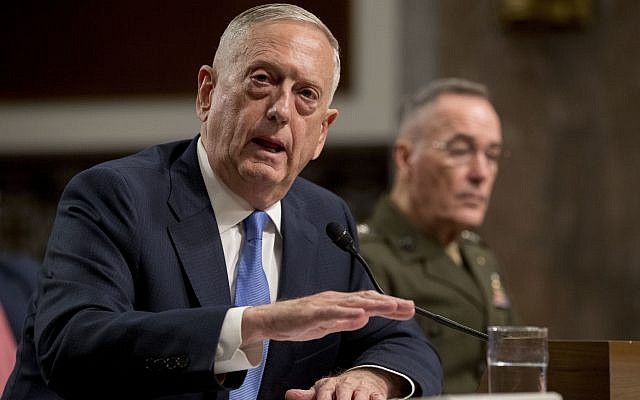
The most likely strategy centers on Trump not certifying Iran’s compliance. Below the president, diplomats and officials would then strive to manage any fallout with Tehran and US allies by emphasizing that Washington isn’t leaving the deal or immediately applying new nuclear sanctions on Iran. After that, Trump wouldn’t have to address the certification matter again, officials said.
The Iran review law provides a potential out for Trump. The president must determine that Iran is implementing the nuclear deal and hasn’t committed a “material breach,” or taken action that could advance its nuclear weapons program. It also demands the president’s verdict on a fourth question: whether suspending sanctions is “appropriate and proportionate,” and if doing so is “vital to the national security interests of the United States.”
Mattis had hinted his boss may try to decertify without breaking the deal.
“You can talk about the conditions under one of those, and not walk away from the other,” he said.
While Mattis described the issues of certification and upholding the deal as “different pieces,” they overlap.
In January, Tillerson must waive multiple sets of sanctions on Iran for the US to uphold its part of the deal. The issue of US national security interests is relevant to those decisions.
As a possible solution, officials said the administration could send the question of sanctions back to Congress. But if lawmakers pass new economic penalties on Iran, the same risk to the overall deal applies.
As reported by The Times of Israel
